 |
| |
e-newsletter of the Centre for Environment Education |
|
|
 |
| May 1-31, 2016 |
|
 |
|
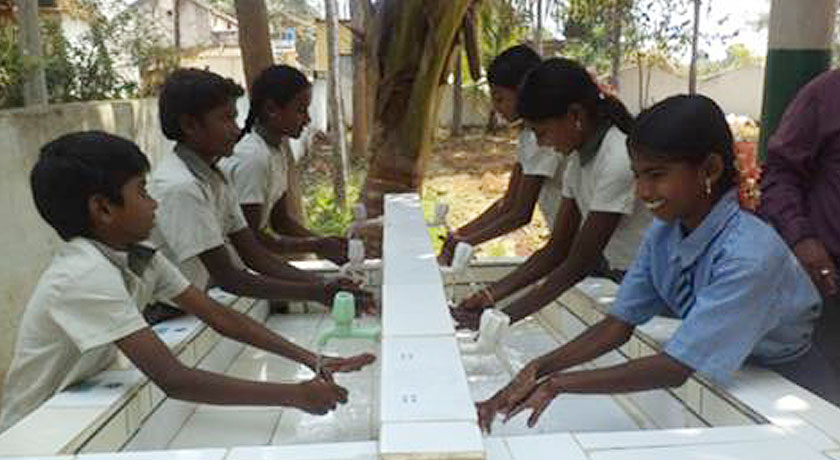 |
| Handwashing practice being implemented in one of the schools of Karnataka |
 |
|
| SWACHA Shale project awarded by UNU-IAS |
|
RCE Bangalore’s SWACHA Shale programme has been acknowledged as the Flagship Project for its role in Contributing to Community Engagement in the field of Health and Nutrition. The accreditation was conferred by the UNU Institute for the Advanced Study of Sustainability (UNU-IAS).
Executed in Karnataka, the programme is a joint initiative of RCE Bangalore, CEE Karnataka, SSA Karnataka and UNICEF, in collaboration with Zilla Panchayat, Ramanagara. It aims at reducing the risk of diarrhoea, and thereby increasing the schools’ attendance and enrolment, by motivating and sustaining the hygiene behaviour, especially hand washing with soap at critical times in schools. On a pilot basis, 55 government schools of Solur Hobli and Ramanagara districts in Karnataka were selected. Various stakeholders associated with schools were sensitised on the importance of WASH in schools, and child friendly innovative hand washing stations were constructed and put into use. Furthermore, the waste water generated was used for establishing a kitchen garden. Hygiene camps for teachers and children were conducted, and community outreach activities were executed.
As an outcome of the above initiatives, schools now have group hand washing units with sustained water supply being used by students, improved hygiene practices, and improved toilet facilities which are optimally used and maintained. Vegetables grown in the kitchen garden are used in mid-day meals, and cooks follow hygiene norms. The reduction in the incidence of water borne diseases among students and zero students’ dropout from schools has established an effective reach to the community.
The programme is now being linked to the Mid-day Meal scheme by the Karnataka government, and is being executed in over 7000 government schools in the state |
|
|
 |
|
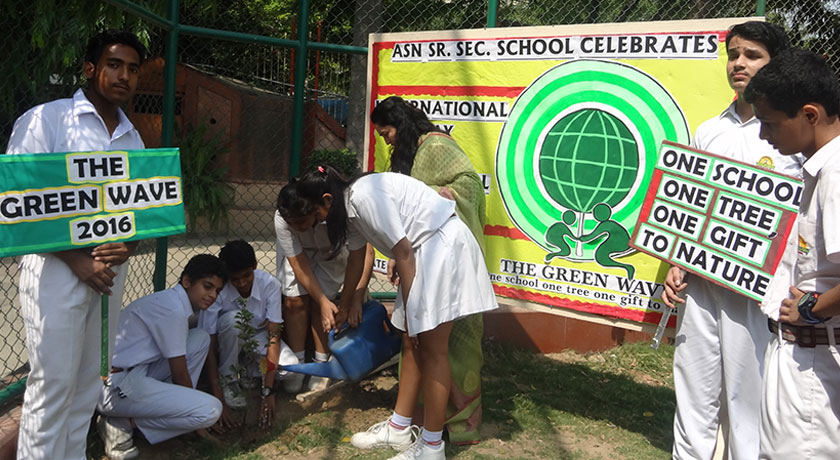 |
|
| Plantation being done by ASN Sr. Sec School, New Delhi |
 |
|
| ‘Green Wave’ on the Earth |
The ‘Green Wave’ campaign is a global tree planting campaign of the UN Convention on Biological Diversity (CBD), which marks the celebration of International Day for Biological Diversity on 22nd May, 2016.
CEE collaborated with CBD on educational efforts in the promotion of Aichi Biodiversity Target 1, which states that, by 2020, at the latest, people become aware of the values of biodiversity and the steps they can take to conserve and use it sustainably.
The plantation activity was carried out in a range of habitats like Coastal, Western Ghats, and the Himalayan region of the country, with participation witnessed from students, teachers, government institutions, NGOs and business houses. The most planted saplings were Neem (Azadirachta indica), Pongamia (Pongamia pinnata), Mango (Mangifera indica) and Banyan (Ficus benghalensis). In all, more than 310 tree saplings were planted across India.
In 2016, CEE tried to promote the campaign in other parts of the globe through its various networks like UNESCO’s ASPNet (Associated Schools Program), and Regional Centres of Expertise (RCEs). Also, 10 schools from the UNESCO ASP Net network in Brazil, actively participated in the campaign. |
 |
|
|
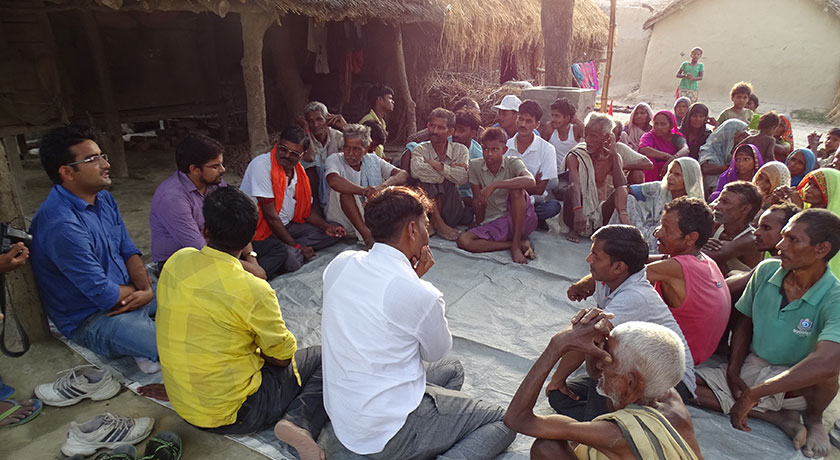 |
| Meeting the community for planning of activities |
 |
Review and monitoring meet for Dolphin Conservation Education Programme |
On 24th May, 2016, CEE North team assembled for the progress review and monitoring of the Ganges River Dolphin Conservation Education Programme, which CEE is implementing, with support from the National Mission for Clean Ganga (NMCG). The programme is being implemented in more than 750 schools and 10 riverside villages at 20 dolphin habitat locations of Uttar Pradesh and Bihar.
CEE has adopted ‘reducing pressure from rivers’ as a conservation strategy for rejuvenating rivers and conserving dolphins. The community component envisages conserving the Ganges river dolphin (locally known as Souns) and its habitat through sustaining livelihoods of river dependent communities.
CEE has formed Souns Sanrakshan Sammitee (SSS)for leading the community-led conservation actions, livelihood interventions and advocacy in 10 villages. For sustainable agriculture and habitat improvement, organically enhanced vegetable and riverbed farming has been initiated in 10 villages with the help of SSS. More than 45 vermin-pits have been constructed and more than 150 farmers have started practicing organic farming at the riverbank areas.
As part of the meet, the CEE team observed the status of project activities, and interacted with the beneficiaries. They conducted community meeting with farmer and fishermen communities who appreciated the initiatives of CEE and NMCG. They discussed about bio-shield plantation for reducing river erosion, livelihood issues, organically growing of short-term flood resilient crops, sanitation, skill development and river dolphin conservation. |
 |
|
 |
 |
|
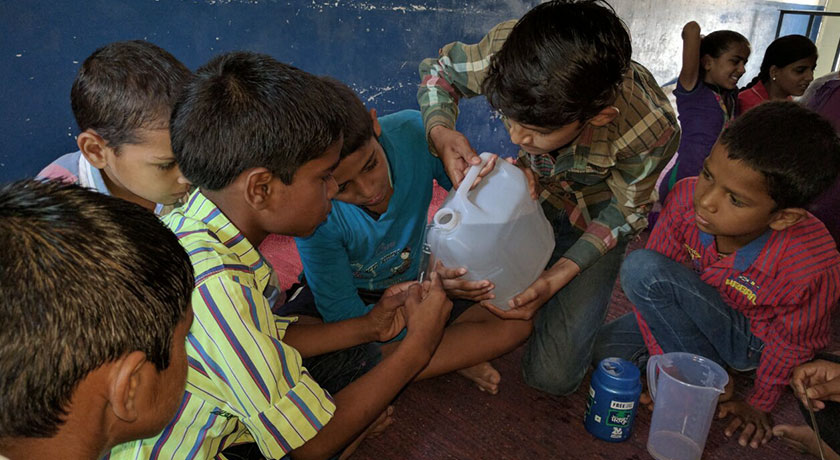 |
| Students learning from ‘Joy of Science’ activities |
 |
|
Summer vacation workshop at Jaipur |
40 children from different schools participated in a week-long summer vacation workshop conducted at Bhamboria, Jaipur, with support from Joseph Cyril Bamford (JCB). Designed around the theme of waste management, water and sanitation, and learning science with fun, the workshop aimed at providing the children with an opportunity to explore new activities and develop their skill through team work.
Hands-on-activities such as separating colours by chromatography, preparing natural colours from flowers and leaves, preparing handmade paper by recycling used paper, origami, thread painting, and making homemade soap, were carried out, as part of teaching them the importance of hand washing and personal hygiene. ‘Joy of Science’ activities like constructing a balloon powered car, balancing pencil on its tip, etc. were also carried out. The workshop culminated with an exposure visit to the Regional Science Museum, Jaipur and Kagzi (paper making factory), Sanganer, Jaipur.
|
 |
|
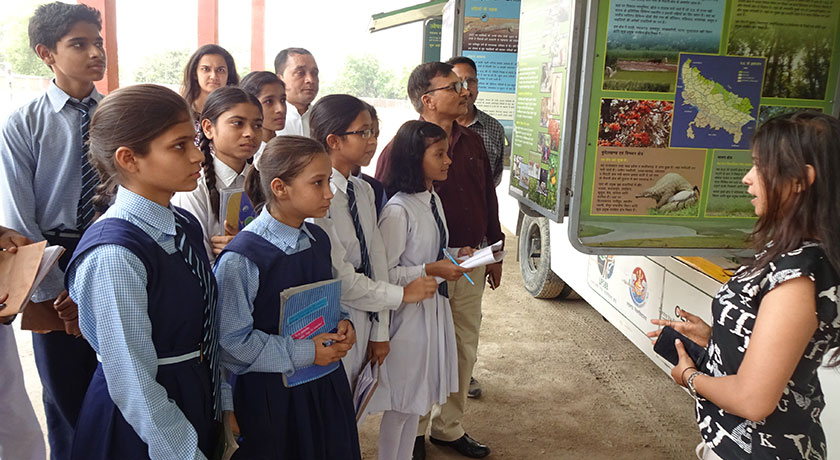 |
| Educator interpreting the living treasures of Uttar Pradesh to the DFO and students |
 |
|
| Prakriti Bus reaches Fatehpur |
A welcome event for Prakriti bus, reaching Fatehpur in Uttar Pradesh, was organised at the Saint John’s School. This was the 13th district reached out by the bus.
Chief Guest Mr. Manik Chandra Yadav, Divisional Forest Officer, welcomed the mobile exhibition and shared his childhood memories of interacting with plants and animals. He also encouraged the children to initiate steps towards saving the rich biodiversity of the State. During its stay in the district, the bus covered 12 schools and 8 villages, benefitting over 10,500 visitors.
From 16th-20th May, 2016, Prakriti Bus also observed the Biodiversity week in schools, whereby, the children were briefed about the International Biodiversity Day, its importance, and the theme for the year. |
|
|
|
|
|
 |
|
CEE is the ENVIS centre on Environmental Education (EE). As an ENVIS centre, CEE caters to the information needs of environmental educators. Write to the CEE ENVIS Centre at [email protected]
|
 |
|
|
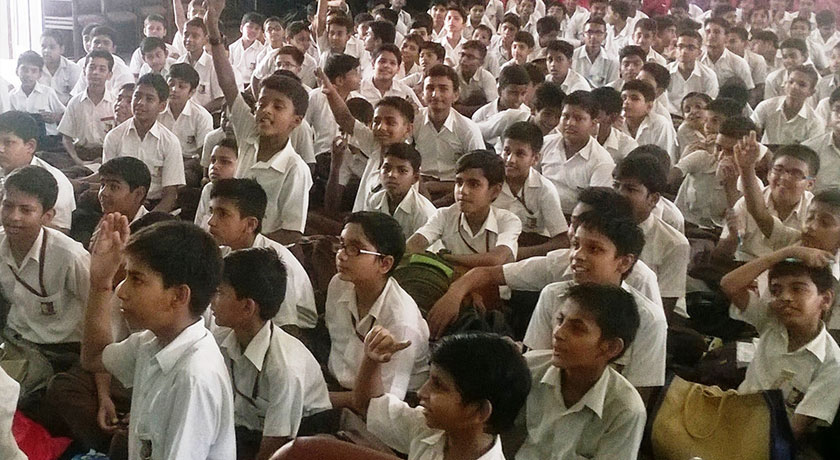 |
| Interaction with students on IBD in progress |
 |
|
| GEF/UNDP SGP and CEE North-India celebrate International Day for Biological Diversity |
Global Environment Facility/ United Nations Development Programme-Small Grants Programme (GEF/UNDP SGP) North-India and CEE North-India, in collaboration with Indo-Gulf, celebrated the International Day for Biological Diversity 2016 (IBD), on 16th May, 2016.
On the occasion, an event was organised at the Aditya Birla Public School (ABPS), Jagdishpur Industrial area, Amethi. The Chief Guest for the occasion, Mr. Gaurav Jain, spoke about the importance of biodiversity conservation, while Mr. Abhinav Sinha, Sr. Manager, Ingo-Gulf, talked about the significance of the IBD, threats to biodiversity in their locality, and the community’s contribution to conservation. Ms. Shweta Gupta, TGT, Science, introduced the CEE team and their work to the students and teachers. The impact of climate change on biodiversity was also discussed.
During the programme, students learned the importance of Biodiversity through games and activities like ‘Image theatre’, ‘Needs and Wants’, ‘Ice breaker’, etc. Mrs. Upmesh Upadhyaya, TGT, Hindi ABPS, used poetry to share her views on the impact of Biodiversity.
|
 |
|
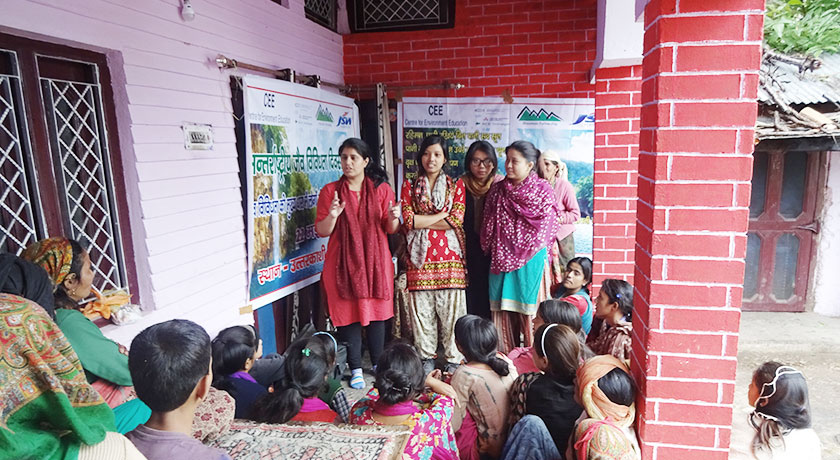 |
| A group discussion on the usage of traditional plants as medicine |
 |
|
International Day for Biological Diversity celebrated in Uttarkashi |
On the occasion of the International Day for Biological Diversity on 22nd May 2016, the CEE Himalaya Team organised and conducted indoor activities with residents of Kuroli village, Mustiksaur cluster (a constellation of five villages), Uttarkashi, Uttarakhand.
The theme for the year ‘Mainstreaming Biodiversity, Sustaining people and their livelihoods’ was conveyed to the participants by various resource persons from different sectors including horticulture, health, DRR, environment and ecology, and social sciences. Mr. Ravindra Panwar, Master Trainer, Herbal Research and Development Institute (HRDI), spoke about the various livelihood opportunities through the cultivation and preservation of medicinal plants, while the other resource persons included Dr. Chandan Kumar, Mr. Jagroshan Singh and Mr. Kushpal from the CEE Uttarkashi Team, and local vaidhyas (traditional herbal healers) - Atra Devi and Kamleshawari Devi, who exhibited some regularly used medicinal plants. Four interns from the Tata Institute of Social Sciences (TISS), Guwahati, were also present.
The event had an interactive session, focused on identifying the unique biodiversity of flora and fauna in the region, followed by an educational programme on the role of biodiversity in mitigating the risks of disasters and climate change in the region. Youth and adolescents prepared ‘rangoli’ using local material, while locals planted saplings of traditional species as part of the plantation activity. The event concluded by felicitating Kamleshawari Devi and Atra Devi for their contribution in safeguarding the traditional healthcare system of the region. |
 |
|
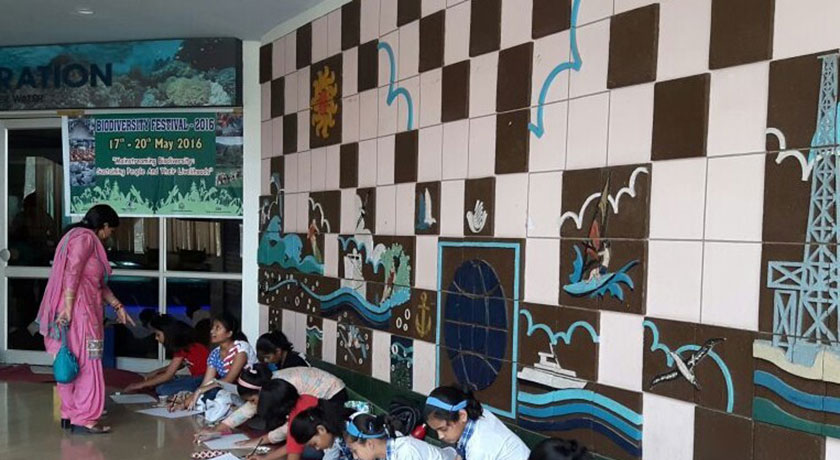 |
| IBD event towards 'Green Wave' campaign in Bettiah |
 |
|
Biodiversity week celebrations |
On the occasion of International Biological Diversity Day, RCE Lucknow observed Biodiversity Week from 17th-20th May, 2016. CEE North, along with the University of Lucknow and UP State Biodiversity Board, as well as Regional Science City and local schools, organised the celebrations, which included a series of competitions and interactive sessions by experts.
More than 300 students from over 15 NGC schools took part in activities and competitions like rangoli, tattoo making, slogan writing, quiz, essay, and painting. Themes for the competitions covered topics ranging from butterflies to the connection of biodiversity with mythology and traditional knowledge, animal trade, and livelihood. Towards the end of the programme, the winners were awarded for their initiatives and performance. |
|
 |
|
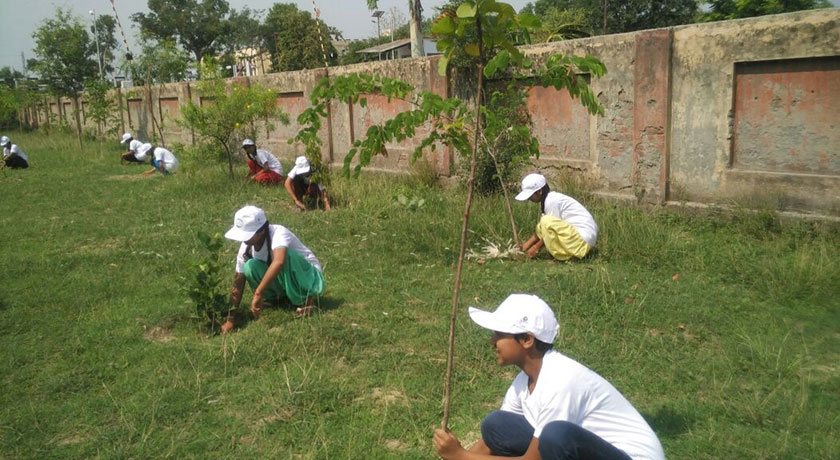 |
| Discussions revolved around the importance of biodiversity in our ecosystem |
 |
|
‘Green Wave’ campaign |
The ‘Green wave’ campaign was celebrated in the Dolphin schools of Bahraich, Gonda, Meerut and Varanasi clusters of Uttar Pradesh, and Bettiah, Begusarai and Supaul clusters of Bihar. Over 30 schools participated in the campaign by planting trees.
An event was also organised at Madhya Vidyalaya, an NGC school in Bettiah. Mr. Hemkant Rai, Divisional Forest Officer, addressed the students on the importance of biodiversity in our ecosystem and motivated them towards taking action in conserving it. Saplings of Arjun, Neem, Guava, Mango, Banyan and Sheesham were planted.
Students of 20 schools under the Children’s Forest Programme (CFP) in Bareilly, Uttar Pradesh, also planted their favourite trees. |
 |
|
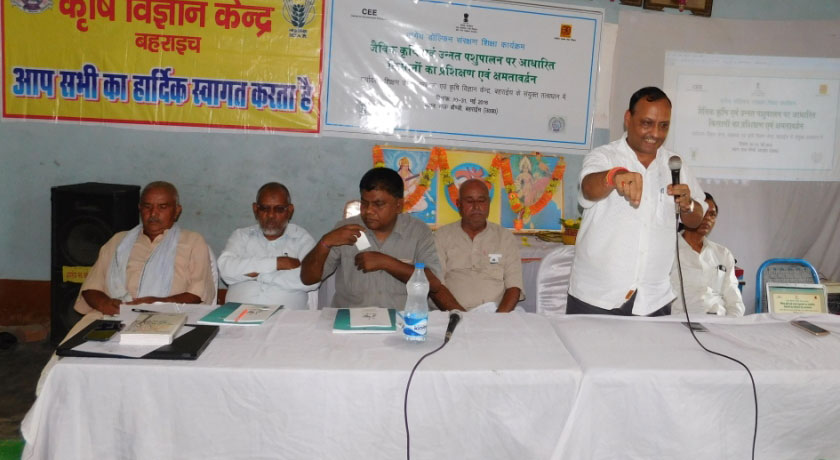 |
| Resource persons conducting the training workshop for Dolphin village farmers |
 |
|
Training workshop on organic farming and improved animal husbandry |
Under the National Mission for Clean Ganga-supported Ganges River Dolphin Conservation Education Programme, a two-day training and capacity building workshop on organic farming and improved animal husbandry was organised for the farmers, by CEE Bahraich.
Over 200 farmers from five dolphin project villages participated in the workshop, which was conducted in collaboration with Krishi Vigyan Kendra (KVK), Bahraich, at the Saraswati Shishu Mandir. The workshop focused on introducing advanced methods of organic farming by utilising readily available products. Farmers were introduced to vermin-composting methods, organic pesticides and liquid manures such as Neemastra, Matka Rasayan, Jeevamrit and Amrit Pani. They were also briefed about the techniques and importance of soil testing. Women farmers expressed interest in organic kitchen gardening. A certificate was also given to the participants. |
 |
|
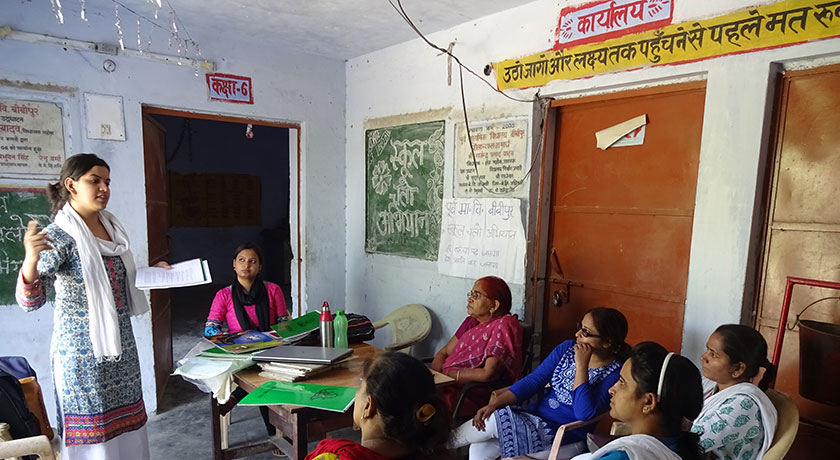 |
| Workshop at a rural PMV school at Bibipur in Lucknow |
 |
|
Continuous Engagement Programme workshops conducted in Uttar Pradesh |
As part of the Paryavaran Mitra initiative, CEE has joined hands with WIPRO for its Earthian initiative, which is implemented in over 6 states. Under the initiative, winner schools were given an opportunity to associate with CEE under the Continuous Engagement Programme (CEP), for a period of three years. 8 schools in UP and Bihar are now a part of the CEP initiative.
School level workshops were organised by CEE North in 6 schools covering Lucknow, Pilibhit, Jalaun and Rohtas districts. In each workshop, 6-10 teachers teaching standards 6th-8th were involved in understanding the module and see linkage to the subject they teach. The second module introduced to schools is focused on Earth and its evolution, which associates with Geography, Science, Languages, and other subjects.
The teachers found the CEP package and methodology interesting and effective in engaging children to understand the difficult concepts of time and evolution. |
|
<
 |
| This message is sent to you by Centre for Environment Education, Thaltej Tekra, Ahmedabad, India and delivered by [email protected]
© CEE 2016 Editorial: Bindu Prashanth, Divika Hinger Design: Pankaj Gorana |
|
|
|
|